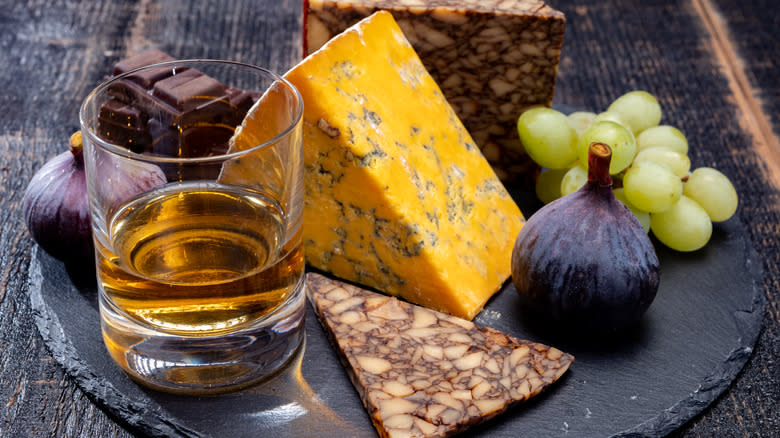The Easiest Way To Pair Cheese With Alcohol That Isn't Wine, According To A Cheesemonger

Few foodstuffs can amplify and transform the flavors of cheese quite like alcoholic beverages. That's why cheese boards are so often seen in the company of wine. The fruity, acidic, and tannic bite of wine can be the perfect foil for rich, unctuous cheese, cutting through the fat and developing balance on the palate. But what if wine just isn't on the mind or is altogether unavailable? Is it possible to pair cheese with other spirits to the same effect? Tasting Table spoke with Laura Downey, a cheesemonger and the owner of Fairfield & Greenwich Cheese Company, to get her expert opinion on how to step away from wine and still find a good pairing for cheese.
"Pairing with beer and spirits can be a challenge," Downey explained. "My advice is to match the size of both ... and look for similar flavors. A light lager style beer with a lighter cheese like fresh chèvre or a Brie. A bourbon with something bold and caramel, such as an aged Gouda. And remember, there are no wrong pairings. If you enjoy it, then it is correct!" If you are familiar with the cheeses and spirits that you plan to pair with each other, then you should be set with Downey's advice. If not, though, speak with the cheesemonger and spirits purveyor to get an idea of what flavors dominate your selections.
Read more: 25 Most Popular Snacks In America Ranked Worst To Best
Experimentation Is The Key To Good Alcohol And Cheese Pairings

Laura Downey's guidance to pair like with like makes sense and is easy to follow, but is still open enough to allow for interpretation. Spirits, beer, and cider cover a wide swath of flavors as do the many different types of cheese, thus, there are nearly limitless combinations from which to choose. For example, scotch drinkers are familiar with the complex layers of smoke, earthy peat, wood, leather, vanilla, and other flavors that arise from a snifter of the whisky.
These assertive flavors can come in waves, intense at times, so pairing it with a cheese that is just as bracing is important. Ripe blue cheese, dappled with veins of mold, can be bold enough to stand toe-to-toe with scotch. As a result of the dairy it's made from, goat cheese has a gamey, funky quality. Evocative of barnyards and terroir, aged goat cheese is firmer than its creamier cousin, chèvre, and is also a bit more rustic. When paired with a dry, acidic country expression of apple cider or perry, the goat cheese can add a delightful roundness to the beverages' punctuating tanginess.
If you're after something a bit sharper, consider a grassy, pointed English cheddar. If it's a bit aged and crumbly, cheddar gets much more intense in flavor, making it a perfect pairing for English bitter beer or creamy stouts. These suggestions are merely jumping-off points for your cheese and spirits journey. As always, experiment, keep notes, and never be afraid to move off the beaten path in search of unexpected pairings.
Read the original article on Tasting Table.

